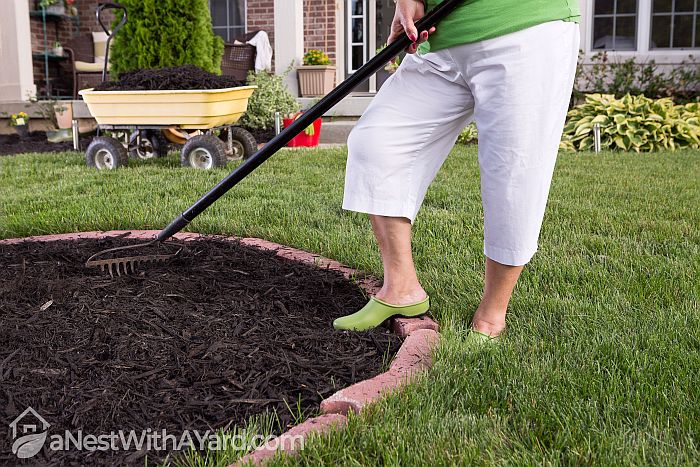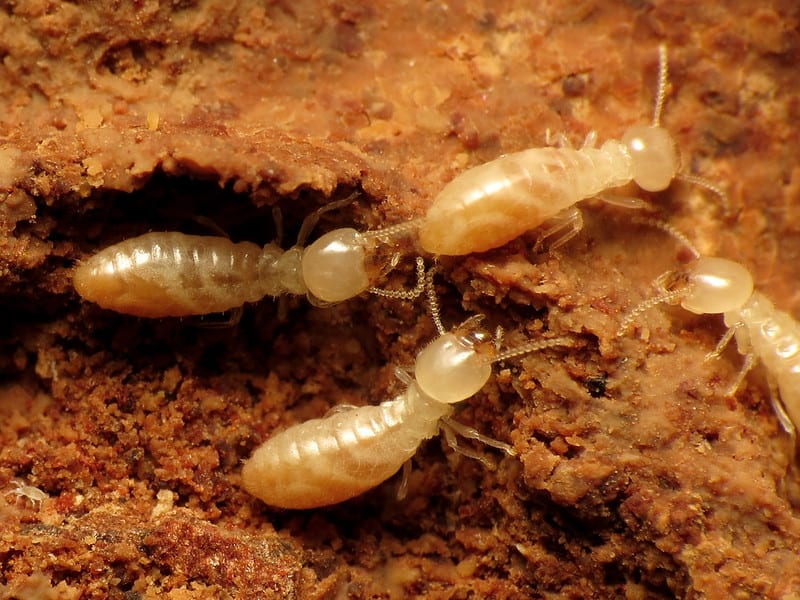Mulch itself doesn’t attract bugs like termites if they aren’t already present, but it can create the perfect environment for bugs and pests to reproduce. Mulch helps fight off weeds and retains the moisture level in the soil. You should, however, apply mulch properly to help control bugs.
Does mulch attract bugs? This question must have crossed your mind as you see bugs roaming happily in your garden.
Mulch is an excellent addition to your lawn, backyard, or garden because it provides excellent nutrients as it decomposes.
It also creates a protective layer that reserves water and guarantees that your plants’ needs are covered. Moreover, it protects the roots of your plants during the cold season.
However, seeing bugs like snails, termites, and even pests like mice is quite common. In this article, we’ll answer all your questions to help you keep your plants in excellent condition.
Contents
- 1 What Is Mulch?
- 2 Does Mulch Attract Bugs?
- 3 Organic Mulch And Bugs
- 4 Inorganic Mulch And Bugs
- 5 Organic Vs. Inorganic Mulch: Which One To Choose?
- 6 Does Mulch Attract Termites?
- 7 Mulch That Doesn’t Attract Termites
- 8 How To Avoid Termites In Mulch: This is What You Need to Do
- 9 Proper Mulching Tips
- 10 Conclusion
- 11 About The Author
What Is Mulch?
Mulch comes in different types, but they all help protect the soil from erosion, retain the moisture, and regulate the temperature as the soil thaws after winter.
Moreover, mulch prevents weeds from getting sun exposure and helps improve the aesthetic value of your landscape.
There are various types of organic and inorganic mulch that you can use in your backyard or garden. Organic mulch, like wood, decomposed veggies, compost, and grass clippings are easy to obtain and quite affordable.
Instead of throwing these items away, you can recycle them by adding them to your garden.
Organic mulch is full of nutrients that can help nourish the soil in spring after the cold season. It helps the trees, flowers, and vegetables grow in perfect condition.
You can also buy inorganic mulch, which could be made of fabric, plastic, rocks, pebbles, seashells, lava rocks, and rubber. Plastic, fabric, and rubber are usually made of recycled materials, so they’re also affordable. Inorganic mulch doesn’t contain any nutrients but can be used several times because it doesn’t decompose.

Does Mulch Attract Bugs?
It depends. Although you can find bugs in mulch, not all types of organic and inorganic mulch will necessarily attract them.
Mulch represents a shelter, so you’re likely to find some pests, bugs, and insects. This shouldn’t be worrying, because these creatures help the organic mulch decompose to release nutrients into the soil and provide the roots of your plants with food.
However, some bugs and pests can be really harmful to your plants. Termites, mice, earwigs, and centipedes will feed on your plants and damage your landscape. They might also attack surrounding buildings.
Organic Mulch And Bugs
Bugs are likely to get attracted to organic mulch because it represents food and shelter. However, some types of organic mulch will prevent the spread of annoying bugs that can damage your plants.
Straw represents an excellent home for several types of larval predators, controlling the population of bugs. Bugs will not be able to lay their eggs around your plants, and straw also prevents fungal infections that can cause the roots to rot.
Some types of mulch, like peat moss, organic bean chaff, and cocoa shells, will repel various kinds of bugs, like termites.
Inorganic Mulch And Bugs
Using inorganic mulch is a potent way of keeping bugs at bay. Rubber, plastic, and other inorganic materials come in different colors that repel insects.
Silver aluminum foil will keep the bugs away, protecting your plants from being eaten by them. Reflection in plastic and rubber confuses pests, so they will stay away from your plants.
Organic Vs. Inorganic Mulch: Which One To Choose?
Organic mulch has several benefits, but it can also create the perfect environment for several pests, bugs, and rodents.
- Organic mulch saves effort and time because it’s made of materials that you already have in the garden.
- It’s affordable, as you simply recycle the materials already in your garden or lawn.
- As the organic mulch decomposes, it enriches the soil, providing your plants with nutrients to grow fast.
However, these are the same reasons why bugs like organic mulch. This is why some people prefer inorganic mulch instead.
- Inorganic mulch lasts longer because it doesn’t decompose.
- Bugs, pests, and rodents won’t find food in the organic mulch.
- If bugs lay their eggs in the soil, the larva won’t have access to food as they grow.
Does Mulch Attract Termites?
Termites are hazardous. They can cause costly and dangerous damage to your home and its foundation.
A termite infestation is a nightmare to every homeowner because they’re tough to control once they spread.
Unlike other bugs and insects, termites have the ability to infest your home and can spend a lot of time undetected. As a matter of fact, research proves that termites cause billions of dollars worth of damage every year.
Mulch can provide the termites with protection if they’re already present. They will multiply and reproduce, creating a colony that you won’t probably be able to fight on your own.
Termites love the moisture of organic mulch. Regular watering and moisture from the rain will be tempting enough for an existing termite colony to expand.
They also find a source of food that helps them grow when you’re using wood mulch in your garden. Some types of wood are more appealing to termites, like white birch, loblolly pine, cypress sapwood, slash pine, and using them in your organic mulch could attract more termites.
You need to water your plants regularly, so you won’t be able to reduce the moisture level in the soil. However, you can use different types of mulch to help keep termites away.
Inorganic mulch doesn’t provide the termites with food but it can help them go undetected by providing shelter.
Pebbles, rocks, plastic, and rubber hide what’s going underneath the surface of the soil, and the termites will have a chance to expand their colony until they reach nearby wood structures.
Whether you’re using organic or inorganic mulch, the trapped moisture will make the soil easier for termites to dig. The termites will keep on digging thin tunnels looking for wood, and the mulch will create the perfect cover for the whole exploration process.
They might reach the deep foundations of your house and then travel inside to feed on your wood furniture.
Mulch might attract termites, depending on what kind of wood you are using, the moisture content beneath the mulch, and if you already have them in your yard.

Mulch That Doesn’t Attract Termites
If you’re concerned about protecting your home from a potential termite infestation, you’re probably wondering about which type of mulch to use.
Although mulch itself won’t attract termites, it will help termites live happily if they’re already present in the area. That being said, they’re likely to prefer wood mulch.
Organic mulch has some nutrients that can represent a tempting source of food, but they are more useful to plants. Termites will eat wood mulch in a state of starvation, but they need to feed on solid wood. Unless there’s access to solid wood, they’re unlikely to survive.
Termites love moisture and dry wood in mulch isn’t be very appealing. As a matter of fact, research says that termites will only feed on wood and wood products if the level of moisture remains high for an extended period.
Although one of the purposes of mulch is to retain the moisture in the soil, the level of moisture might not be too high if you apply mulch properly.
Store-bought mulch is usually safer to use than using your own recycled wood chips and grass clippings.
Termites are unlikely to survive the process of chipping that bags of mulch go through. Even if a few termites managed to survive, they would die soon after they have been separated from the rest of the colony.
Although termites feed on wood, some types of wood actually repel termites. Some are even toxic and will kill termites, helping you to put a probable infestation under control.
Cypress heartwood, California redwood, eucalyptus, melaleuca, cedar, and southern tidewater red cypress are more resistant to termites, so they should be used if you’re planning to use the wood mulch in your garden.
How To Avoid Termites In Mulch: This is What You Need to Do
It is now clear that mulch won’t attract bugs, especially termites, but it can help the colony flourish if it is already there. This can be avoided by following these tips:
- Use mulch from a trustworthy source.
- Check the contents of organic mulch, and avoid the types of wood that termites find more appealing.
- If you have termites in the soil, hire a professional service. Professional pest control is the only way to deal with a possible infestation.
Proper Mulching Tips
You should make sure that you’re following the correct steps when mulching. This will guarantee the best benefits while keeping annoying bugs at bay.
- Leave at least an area of one foot wide between mulch and the foundation of your house. This will repel termites and prevent them from digging their tunnels. You can leave this area bare or cover it with pebbles, rocks, or any type of inorganic mulch to improve the aesthetic value of your landscape.
- Make sure that the slope of the ground allows water to run away from the foundation, rather than towards it. Moisture attracts termites and other bugs, so you should make sure that the foundation of your house is dry.
- At least six feet should be left between the foundation and the siding. This prevents moisture from traveling up to the solid wood in your house.
- When you add mulch, make sure that the layer is only 2 or 3 inches deep. If the mulch is too thick, it will trap too much moisture in the soil and will attract termites and bugs. If the layer is too thin, it might not provide the soil with all the needed nutrients.
- Make sure that any watered mulch doesn’t reach the foundation or walls of your house. You should keep this area dry to repel bugs.
- Use a rake to aerate the mulch. This will help dry it out if too much moisture is trapped under it, regardless of the type you’re using. It will also help you determine the right amount of mulch that needs to be added to the soil.
- Always remove old mulch before adding a new layer.
- Keep an eye on the signs of termites. Any above-ground tunneling signs should be examined to make sure that a probable infestation is under control.
Conclusion
Organic mulch provides your plants with nutrients and retains the level of moisture. Inorganic mulch lasts for long and helps your plant roots survive as the temperature changes.
So the question is: does mulch attract bugs? The answer is no.
The mulch itself won’t attract bugs, pests, or rodents, but will provide shelter for them if they’re already present in your garden or backyard.
Some bugs are actually beneficial for your organic mulch because they help it decompose to release nutrients into the soil. However, termites, for example, can represent a serious threat to any wood structure nearby.
- If you know you have pests, hire a professional service to get rid of them.
- Buy your mulch from a trustworthy source.
- Keep an eye on the telltale signs of termites to act accordingly.
Apply the suggested mulching tips and let us know what you think in the comments below.
